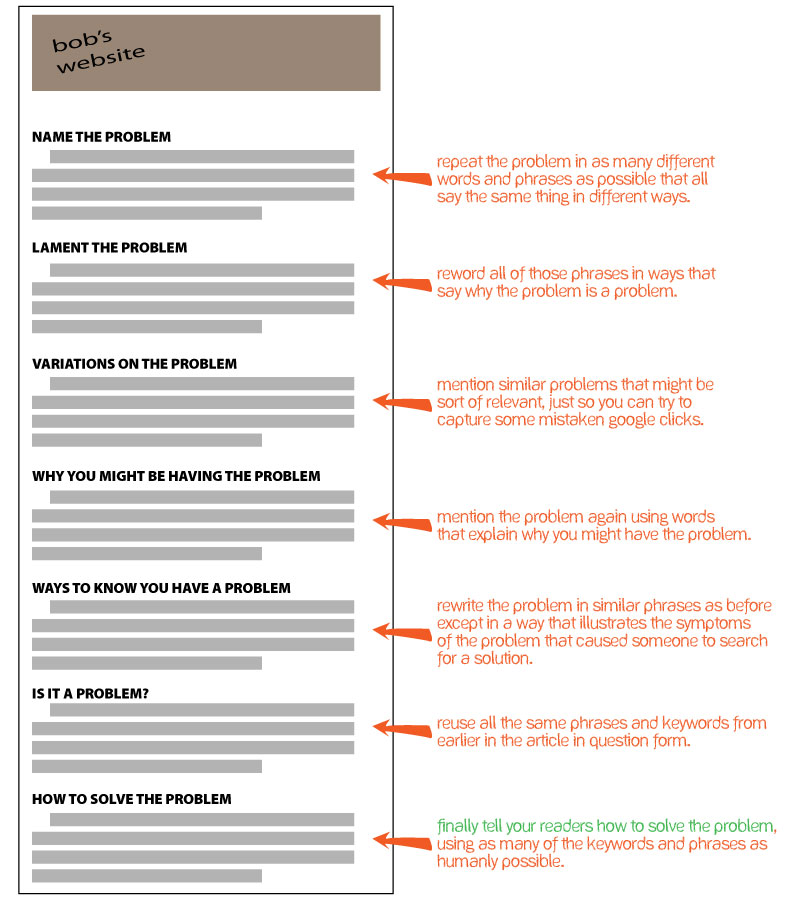When should you ignore SEO best practices?
Jan 15, 2021 5:11 pm
Do you want to be a Search Result? Or a Trusted Expert? Here's the difference.
Hello Content Creators!
You know who got hammered lately?*
Pages and websites that focused exclusively on being a top search result.
You know who's benefitting from that?
Trusted Experts.
Funny thing is, the Trusted Experts were already winning on search, too. They just didn't have to sound like robots to do it.
What's the difference?
Have you ever searched for an answer to something and seen four or five results that all looked identical?
That's because there is a well known structure for writing rigidly SEO friendly "expert" answers for a topic. It goes something like this:
Standard SEO advice for ranking highly for a given search query is to identify the problem, repeat the problem in multiple ways that people are likely to search for, explain the problem, mention variations on the problem, and on and on and on...
Then, finally, at the bottom, provide the solution to the problem.
The problem with this is that 90% or more of the post is written for the sole purpose of getting it to rank highly in search...NOT to solve your problem!
If it works, what's the problem?
Because every site trying to rank for that same search query is doing the same damn thing. This only really works if you:
- do it first
- do it perfectly
- or do it better than everyone else
The other problem is that it's only driving traffic to that one single post on your site.
Meaning, your bounce rate (people leaving after visiting only a single page) is super high. You haven't given anyone a reason to check out the rest of your content. Google don't like that.
I still don't see the problem.
It depends on your goals. Are you trying to create an audience of fans that come to you for stories and information all the time, to see what you're interested in because they'll probably find it interesting, too?
Or are you just trying to capture eyeballs for a specific search query, and don't mind creating formulaic content for hundreds of other very specific search queries, too?
If you're selling a very specific product or service, those SEO-driven posts might be the way to go. But they won't build a fan base.
WWRBD?
When I'm pondering a marketing play, I often ask myself:
What Would Red Bull Do?
Red Bull didn't build a rabid fan base by writing authority posts on "What is glucuronolactone and is it dangerous?".
Rather, they built an insanely profitable, respected global consumer product brand and media empire by sharing tales of adventure and insane human performance.
People seek out Red Bull's content for fun. So much so that Red Bull is able to sell their content, for money! People see Red Bull as an expert in being awesome, so they're happy to align with the brand, buy the products, and share their stories.
Do you think people are enthusiastically recounting the SEO-heavy, robotic-sounding solution from Bob's Website? Nope.
------
*Who got hammered: Google's core algorithm recently (and dramatically) penalized sites that used "research based" (aka "bullet point copy-and-paste") guides and stories that weren't inline with their apparent expertise. So, all those sites that just posted Top 10 lists but didn't have a focus on making great content around a central theme? Their search rankings were pummeled. The lesson? Focus on content that's relevant to your brand, your products, and your area of expertise...that's what Google is looking for.
(Did you get this email from a friend? Subscribe here.)
A Recent Content Project
I mentioned this tactic in a recent email and wanted to show how we use it on Bikerumor, the cycling tech blog I founded.
This also illustrates another benefit of using stories and "humanized" content to build authority and respect as an expert in a category.
For us, that's bicycles and related tech.
As such, we're able to confidently predict what's coming, share some of our hopes and dreams of what could come, and tie together disparate industry trends into coherent thoughts for our readers.
The result is an extremely popular series of stories we published that tease what's coming up. Readers love it, and we get a great response from the industry, too.
You don't have to be a media company to publish these types of stories. What does your brand know about its category that your customers would find interesting to learn? Could you tease new technologies you're experimenting with? New materials? New delivery methods?
Trust me, you can build just as much SEO value into stories as you can any other type of content. It's just that these will be ones people actually want to read.
A Quick Favor...
Normally, I wrap up with a few cool things I've found. This week, I'm hoping you can help me find a few more cool subscribers. Can you share this link with co-workers, friends that "do marketing real good", or anyone who's in the content creation business?
http://sendfox.com/bitesizecontent
I'd really appreciate it. Much of the content I share here isn't posted anywhere else, or if it is, it's days or weeks after you get it first in your inbox. That's my way of saying thanks for subscribing.
Don't look back,
Tyler Benedict
*Any items, services, or products mentioned in these emails are provided solely because I think you'll like them. I don't sell this space, but some links might be affiliate links, which earns me a small commission (beer money, really) if you buy something. This helps support all the free content. Thanks!



